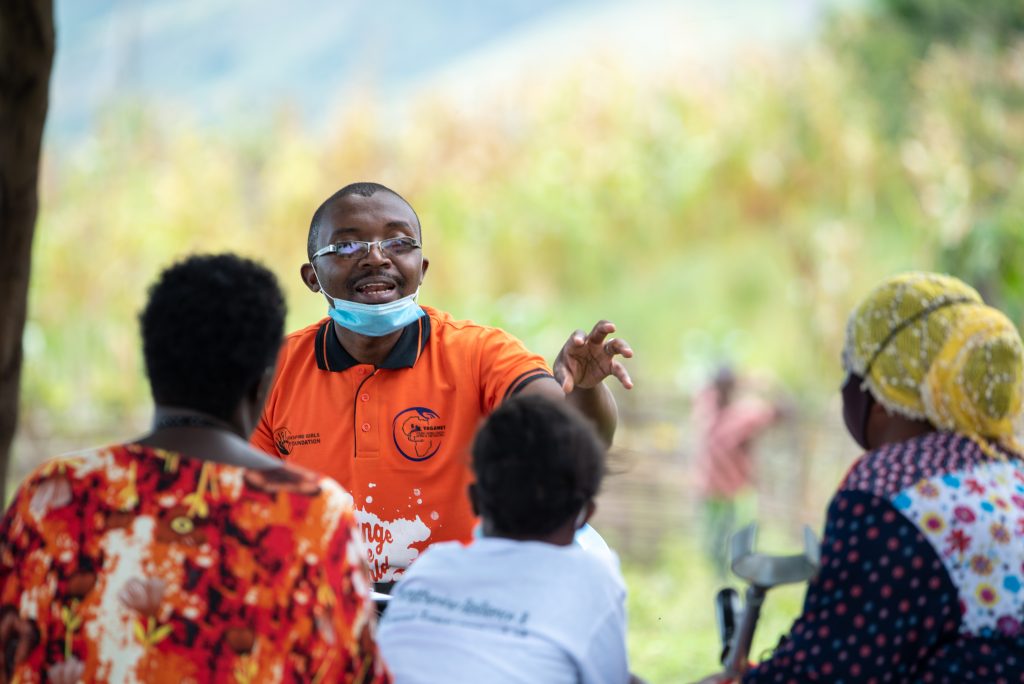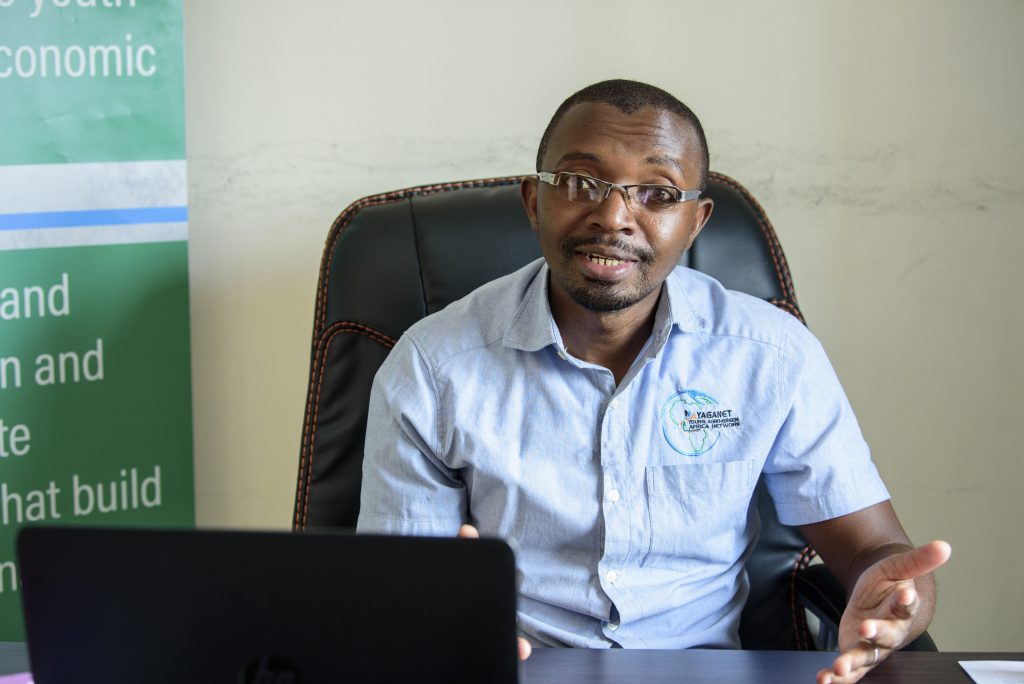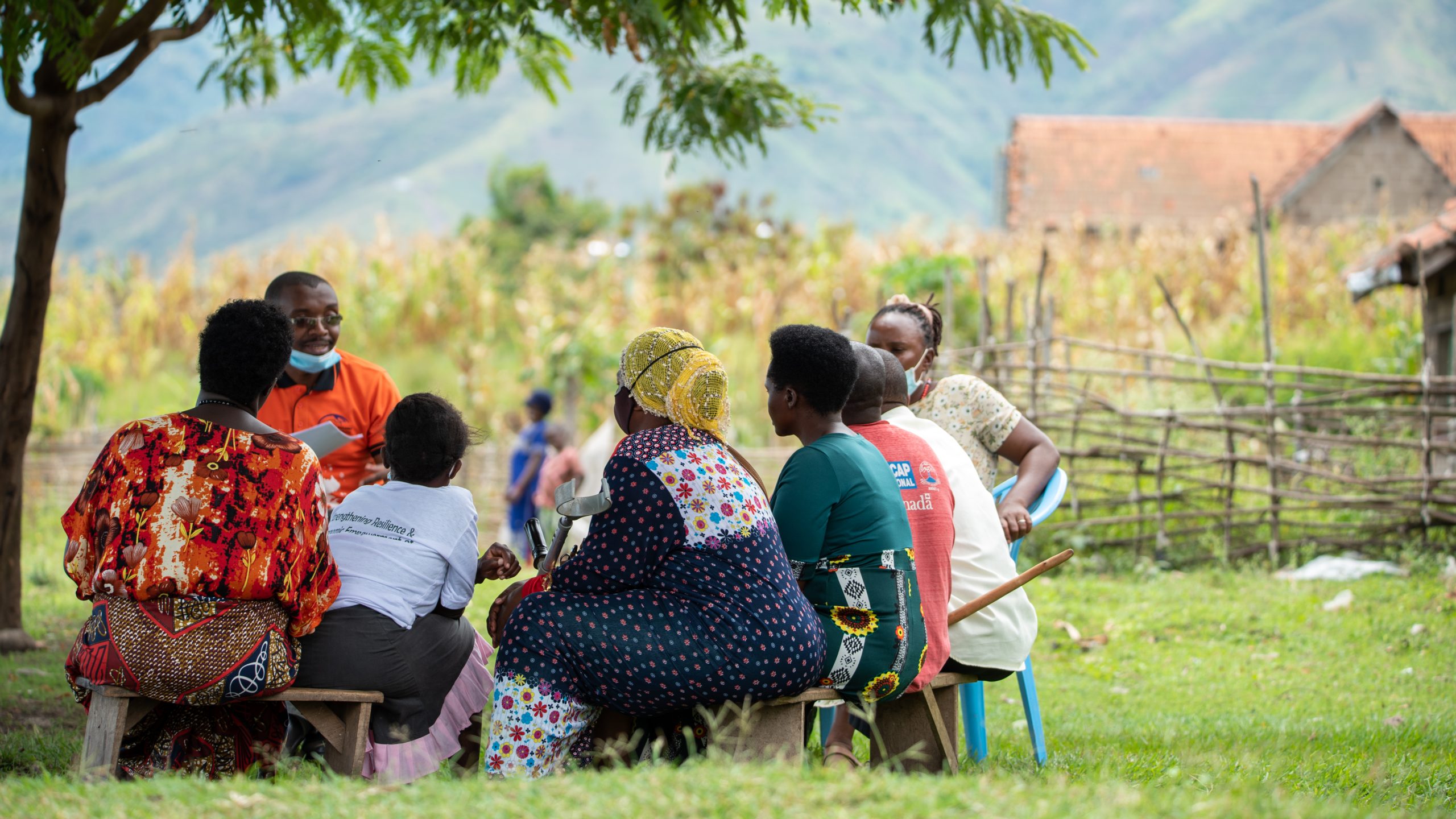Movement Matters #6 – Young Agro-Green Africa Network (YAGANET)
Baluku Isaya is from the Rwenzori sub-region in Mid-Western Uganda. He is passionate about community-led initiatives and grew up in a farming background, where he cultivated his love of nature. In this month’s column, Isaya shares his journey to founding YAGANET, an organization focused on community-based interventions and unleashing the power in young people and women, and delves into how he lives through a positive mindset to impact his community.
Sera Bulbul: Can you tell me a bit about your childhood life and your background?
Baluku Isaya: I have gotten to where I am by making a series of challenging decisions. I grew up in a farming background, in a small rural borderland village called Kanyatsi I, at the border with DRC. I lost my father at a young age. Left with a struggling young mother who toiled to ensure I finished school. Through hard work, I was offered a bursary from my former school proprietor and Bishop Masereka Foundation which enabled me to advance to senior 6 (A level). During my vacation in 2007, worked a part-time job as a school canteen attendant, with my passion and love for education, I kept saving my little money with the hope of joining college. Education needs more than passion and sacrifice, it requires money.
In 2008, I enrolled for a Bachelor’s Degree in Counselling and Social Development. Little did I know, the money I had saved was not enough to push me up to the second year. I made another challenging decision; changed my study plan from day to evening program where instead of joining class during the day I would work on my small business and join lectures in the evenings. I divided the $120 that I had remaining: with some of it I started a small business of selling ‘yellow bananas, g-nuts and women’s clothing (Bitenge)’, and the rest I sent back home to my mom who later switched from pancake making business to a fish vending business. I worked hard during the day and went to lectures in the evenings. My small business, together with my mom’s fish vending business helped me access basic needs, paid my tuition, and I completed my university course.
SB: After making those decisions and finishing university, how did you get to this point in your work, founding an organization?
Baluku Isaya: When I looked back at how the small sum of money I offered my mom changed her business life and my education career, I felt compelled to give back to the community in any way after finishing university. Two years down the road, in 2013, I started part-time work as a research assistant at Infectious Diseases Research Collaboration (IDRC)-Mbarara, interviewing and documenting responses from the community members. The challenges I found women and young people facing in the communities further strengthened my commitment to putting in place a social enterprise that would answer my passion.
Even when I was offered full-time employment at IDRC in 2014, I still wanted to do more for my community. In late 2015, I made another challenging decision, this time leaving my good-paying job to return home and embark on my dream. I wanted to do something for the women and young people in my home community running or those who need to initiate small-scale businesses just like my mother.
While in the community, many young people and women were challenged by the lack of knowledge and skills to make informed financial decisions. To address this, I mobilized, trained, and established small savings groups of young women who were also vending foodstuffs. These were the women who wanted to access loans but they were being limited by the lack of collateral to receive them. I showed them the potential they had to become their own village banks that could help them access loans without limitations. Six months down the road, these small savings groups started seeing the fruits of community savings and lending associations because they had started accumulating good money and offering loans at ease.
As a member of the young farmer’s network, in 2016, through GIZ Uganda, I was trained as a Financial Literacy trainer, something I had been striving for quite some time. This strengthened my passion for creating and transforming small, climate-resilient agri-businesses owned by young people and women. I later championed the campaign to create financial literacy awareness among young people in schools and farmers from rural communities across the country, reaching out to over 20,000 people imparted with financial literacy knowledge and skills. As a result of my efforts towards contributing to the financial literacy strategy in the country, I became one of the Certified Financial Literacy Master Trainers by the Bank of Uganda.
SB: What advice would you give to someone new to community-led development?
Baluku Isaya: Community-led Development looks at programs driven by the people themselves and facilitated by community-based organizations.
I would advise you to always do something that drives you. Don’t do something because you saw someone else doing it, let your passion drives you. Let the benefit of your actions be meant for the good of the community and not for your personal interest. Let the community members be at the center of your actions. Your work will be sustainable when the community owns it – if the community is part of the initiative, it will succeed.
SB: YAGANET was founded in 2016. Can you tell me more about its founding and how it has grown since then?
Baluku Isaya: The idea to initiate YAGANET started in 2014, but it was legally formalized in 2016 as a non-profit community-led organization. Since our inception, we have been leveraging community resources, making sure the communities we engage champion their own transformation.
YAGANET envisions empowered and resilient young people-led sustainable transformation. Our mission is to enable young people to initiate, own and effectively lead climate-resilient enterprises that promote equality, build communities, and transform lives.
In the past six years, things have changed at YAGANET. We started with one program pillar: Gender and financial inclusion, working to ensure that even young people and women from underserved communities access knowledge and skills to manage their resources and make financially informed decisions while running their small-scale climate-resilient agribusinesses. Our goal was focused on fixing income imbalances and giving power and resources to women to earn a living. YAGANET recognizes the need for young women and men to gain access to financial services, and financial education to end Gender-based violence at the household level.
Reflecting on our history, community feedback, and the environment our target beneficiaries live in, we established more three programs that focus on:
- Climate justice agribusiness and response to the effects of climate change: a program where we promote community-led actions that are needed to transform and reorient agricultural systems to effectively support development and ensure food security in a changing climate and also effectively respond in times of emergencies.
- Mentorship and skills development: How can we empower a generation of young people with skills that promote equality in the community, transform communities, and improve their livelihoods? Young people from disadvantaged backgrounds do not have access to the skills required to successfully compete for available opportunities and or socially thrive. This program offers flexible and measurable learning solutions for young people, especially girls and women, to solve challenges in their lives and enable their holistic social and economic development
- Research and Advocacy: YAGANET recognizes the value of evidence-based interventions towards social challenges affecting women and young people, for instance ending malnutrition, and unsafe environmental conditions that hinder community transformation. We engage in a variety of advocacy programs to make sure that community members have the voice to speak out about their needs. MCLD recently supported our project promoting access to good food and nutrition and WASH specifically targeting persons with disabilities.
SB: How has your community changed with time?
Baluku Isaya: I have seen a very positive change in the community when it comes to resilience, ownership, initiating, and living their own transformations. When YAGANET first started, some community members saw it as an opportunity for an organization to give them everything they needed. We realized that we must not let the community look at us as the source of all the support they needed. We instead worked to make sure that we mentored and changed the mindset of the community to understand that they owned the challenges and that the solutions must come from within.
As time went by, they understood our approach more and more, to the point where now the community we engage in our work is in charge. It is now the community that identifies practices for conservation, who are champions of nutrition, and who invest money by themselves. Yes, they come to us for advice or ask for us to observe, but the answers come from within.
At the center of our work, we believe in shifting the power to communities since they have the potential to solve their problems, they just need little guidance to succeed. In one of the program interventions under mentorship, we conducted a community needs assessment among young people, we realized that, their key needs related to inclusive WASH practices. The majority highlighted how soap is expensive amidst the high economic challenges and many girls had hygiene challenges. Through brainstorming, together we found a solution: We mobilized some community members and procured some materials to train 200 young girls and boys in bar soap making, where the Local council chairman III offered to facilitate the trainer every time he comes to the community. And some girls are producing climate-resilient re-useable sanitary pads with sewing machines bought using money raised by community members.
SB: What are the main things you want people to know about creating sustainable livelihoods for youth and women in rural communities in Uganda?
Baluku Isaya: Creating a sustainable livelihood should be driven by individuals’ or people’s commitment to transforming themselves. It is important to me that people understand that within themselves they have the potential to create any situation in their lives without expecting support from the outside. The transformation of communities should be initiated and championed by community members who want change. I want to see community members having a positive mindset in everything they do, seeing potential in themselves, and knowing that whatever challenges they face are not seen as barriers to success.
I believe that the answer to creating sustainable livelihoods always starts with positive thinking about everything around them. Having a positive mindset that all sectors if carefully selected can enable one to generate an income. With few resources, for example, one can start any business along the agricultural value chain and improve livelihoods forever. Believing that we can take small actions that require local resources.
Young people must understand the reason for which they are in existence. Everyone exists for a purpose, something you must contribute to for the good of the environment and community you live in. Be open to the world, have an open heart, and know that there will always be challenges requiring expert knowledge, but also know your community is the best expert to solve its problems. It is all about knowing the potential around you and then starting on your journey of inclusive actions that leave no one behind, this is the foundation of sustainable transformation.

SB: What are you proudest of?
Baluku Isaya: I am proud of myself for everything especially certain life barriers or setbacks I have overcome, leading me to change many perspectives on things. With all the little goals I have managed to accomplish in life, whether big or small, I am proud of myself for everything.
For some time, I had been looking for a platform that focuses on strengthening the capacity of community-led entrepreneurs or initiatives focused on empowering communities to become change agents. I am a proud member of MCLD. It’s such a platform that I longed for.
I did not know there was more that we were required to do in ensuring communities look at themselves as the only opportunity to transform their lives. The two years as a member of the MCLD Uganda chapter have tremendously changed the way YAGANET operates. It slowly influenced a shift in our strategic plan. We first wrote our strategic plan alone, but through the chapter, we are learning about the need to engage communities in the process of formulating our strategic plan for ownership.
I must not forget to mention that I am also proud of a woman who gave birth to me and contributed to whom I am today. She taught me how to be resilient, she is the genesis of my passion for community work to impact the lives of young people and women. In reality, YAGANET is providing the opportunity to pay back to the community now.
SB: How did you hear about MCLD and what drew you to it?
Baluku Isaya: Through social media! I met Matte Jockas. I followed him and saw his posts about MCLD. It looked related to what I was doing, so I asked him for more information.
Matte sent me the contact information for Ms. Joanna Mbakulo the Coordinator of MCLD-Uganda Chapter, whom I contacted. Joanna later added me to the MCLD WhatsApp group and I kept receiving links for the monthly calls. Since then I have never turned back. I have learned a lot from the chapter. MCLD-Uganda has documented our work with persons with disabilities and also supported YAGANET with some funds used to advocate for inclusive access to good food, nutrition, and WASH practices.
SB: What else do you want people to know about you?
Baluku Isaya: There are always one or two things that every human being was born to do. If you have a chance, and you’re lucky enough to realize your passion, please don’t let it down. Take a step. Don’t live in a wishful world, but in an actionable world. Take actions that are resilient and make sure that your life purpose is felt by others around you.
In whatever situation you are in, lead as an example. Your passion is a driver of your actions, don’t betray it. When you are focusing on creating change, start, resources will always find you along the way. Your life will also be transformed while you focus on changing the community you live in. Ensure that people learn from the good things you are doing. Impact someone every day, do one good thing. That one good thing will change a life, change a village and transform a community.
Contact YAGANET:
Located on Plot 52, Bwambale Henry Road, Kasese Municipality, Kasese District Tel; +256 788 088 032,
Email; info@yaganet.org, ibaluku@yaganet.org Website: www.yaganet.org, and find YAGANET on Facebook, Twitter, and LinkedIn.
About Baluku Isaya

Baluku Isaya is highly self-motivated and supportive with strong community ethics, a passionate Farmer, and founder of Young Agro-green Africa Network (YAGANET), a not-for-profit community organization legally registered to promote grassroots-led initiatives.
Isaya is a Bank of Uganda (BoU) Certified Financial Literacy Master Trainer. OpenEd Fellow 2019 with Open Sustainability Institute, Business Innovation for Good, and Resilient African Network.
A Youth Technical Specialist with more than 7 years of experience in implementing youth-related programs/projects in areas of Community-led Conservational work, Prevention of Violence Against Women and Girls; Financial Inclusion Strategies-Financial literacy; Agricultural practices, and Capacity Building.
Isaya also supports Monitoring, Evaluation, and Learning for the Movement for Community-Led Development (MCLD) Uganda chapter.


